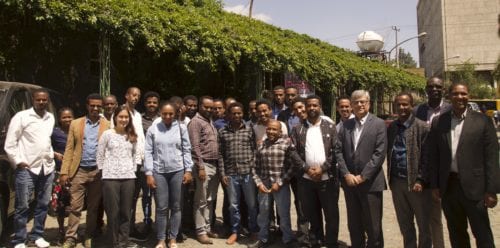
It Takes a Village: Ethiopia Builds on Global Minigrid Experience
The Ethiopian government plans to use transformative energy access programs as a foundation for its economic growth. Of the country’s 105 million residents, only 44 percent have electricity access today. Thus, the challenge of electrification is extreme. Achieving universal access by 2025 will require concerted planning, immediate action, and deep commitment. Lessons learned from decades of minigrid experience around the world offer stepping stones on which Ethiopia can build. To support the Ethiopian foray into minigrids, RMI brought expertise from around the world, including West Africa, the Caribbean, India, and the United States.
Geospatial mapping has identified over a thousand minigrids that could be built by 2025. The government has prioritized 286 sites, which will be permanent solutions for rural regions far from the grid. Of these, 12 pilots are currently being implemented by the Ethiopian Electric Utility (EEU, the institution responsible for rural electrification in Ethiopia), with an additional 25 in the tendering process.
Only 19,000 minigrids have been installed worldwide, so installing 1,000 minigrids in Ethiopia will be no small task. To be successful, this minigrid program will require competent, knowledgeable staff and a robust tendering process. Further, Ethiopia must overcome other challenges, including the need to capture minigrid cost reduction opportunities to increase project commercial viability and optimize the use of limited resources.
RMI’s global experience with electricity project implementation, tendering, and operation enables us to provide effective support to the nascent minigrid program. For instance, lessons learned from the project design in the Caribbean islands and our extensive techno-economic modeling can inform Ethiopian projects and help avoid many of the pitfalls encountered in other countries.
Minigrids can add value in rural communities by creating self-contained energy systems in areas that are remote or cross difficult terrain. Such areas are hard to reach through traditional grid extension.

In October, RMI and the Universal Electricity Access Program (UEAP) of the EEU collaborated to strengthen and build capacity on off-grid electrification efforts through a training for UEAP and EEU staff.
UEAP identified gaps in knowledge and the need for additional expertise in a range of areas related to minigrid development. RMI pulled in global expertise to prepare a tailor-made training to build technical proficiency in planning, site selection, design, and installation, and give insights on tendering and procurement processes.
Twenty-nine technical and managerial officers across the two government institutions benefited from the diverse knowledge presented at the training. EEU staff sought familiarity with minigrid system planning and operation, while the UEAP focused on system tendering and installation. RMI shared experiences from Nigeria, Uganda, the United States, and our program in the Caribbean islands. India’s Institute for Transformative Technologies (ITT) joined the training to deliver practical hands-on knowledge.
“Many partners, one team, one strategic plan to achieve… 100% Electric Access coverage by 2025.”
-Tilahun Legesse, Director, Universal Electric Access Program, Ethiopian Electric Utility
Throughout the training, participants worked to better understand direct design processes and the applicability of criteria to specific situations. Later, the participants reflected that the training provided a “good understanding in minigrid design, installation, and commissioning . . . [and instruction] regarding tendering and contract management”—all areas of previous concern.
The participants determined a series of next steps that they, along with RMI and other partners, will implement to strengthen the success of their minigrid program. In particular, they emphasized a greater need for on-the-ground engagement through site visits and productive use programs, as well as increased planning for ongoing project sustainability once the minigrid is transferred from the contractor back to the utility.
Participants of the RMI-UEAP training talk with RMI’s Fidel Neverson about minigrid contract design.

RMI in the Ethiopian Energy Sector
RMI has worked in the Ethiopian energy sector for over two years and is committed to supporting the country with addressing complex energy challenges to unlock enormous opportunities for economic and social development.
We will continue to support the Government of Ethiopia through holistic energy planning, pilot and project implementation, and capacity building and energy leadership to facilitate the second National Electrification Program (NEP 2.0), which establishes government commitment to universal access.
Today, our team focuses on productive energy use in the agricultural sector, off-grid program development, and energy efficiency. We will be sharing more about each of these focus areas in an upcoming blog series. For more immediate information or to contact our team, please email ece@rmi.org. Follow us on twitter (@RMI_ECE) to see our team in action.